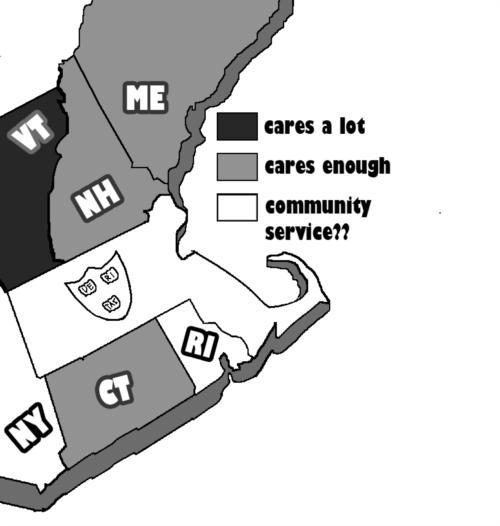Not too long ago, I received an e-mail from the Harvard Objectivist Club, inviting everyone “disillusioned with today’s intellectual and political climate” to a meeting discussing why “being selfish is not wrong.” I’ve never understood why the objectivists believed altruism irrational and dishonest, and I was particularly irritated to see such nonsense in my inbox. Yet their views are but symptoms of a much larger problem here at the College.
This week, the federal Corporation for National and Community Service released a comprehensive study on college student volunteering entitled “College Students Helping America.” The rosy report found that volunteering increased by 20 percent from 2002 to 2005, representing 600,000 more students dedicating their time to civic engagement. Some colleges—Elon University, Indiana University-Purdue University Indianapolis, and California State University, Monterey Bay—will receive the first President’s Higher Education Community Service Honor Roll awards for exemplary civic contributions. Others will receive awards for their hurricane relief efforts.
But as I read the report, one question loomed like Dr. Eckleburg’s eyes: Where’s Harvard?
Harvard—and Massachusetts as a whole—was nowhere to be seen. The study included a map on which states were shaded by various hues of red: the darker the hue, the greater the percentage of college student volunteers in that state. Massachusetts, as it were, was an immaculate white. (I won’t try to explain the significant positive correlation between red states on this map and those on a traditional red-blue map. The political repercussions are beyond this piece.) Coming in 47th out of 50 states, the state that puts “The Spirit of America” on its license plates had a 24 percent college volunteering rate, 6.5 percent below the national average and better than only New York, Nevada, and Georgia—a rare political outlier.
Harvard can’t bear the collective responsibility for the civic failure of Massachusetts’ students, but it’s obvious some of my peers here don’t exude any enthusiasm for service. While a devoted student contingent serves close to 10,000 clients in the Cambridge area through the Phillips Brooks House Association, most are less generous with their time. Some revel in privileged positions of “high society,” and just the thought of feeding an old woman at a nursery home or picking up garbage at a park wounds their narcissism. Others structure their extracurriculars around careerist goals, sacrificing their souls into the void of ambition. Amidst la vie occupée, how could they find time to serve others?
There is one veritas: The College just doesn’t consider community service a priority. You can see as much in the College’s mission statement, written by former Dean of the College Harry R. Lewis in 1997, which “encourages students to respect ideas and their free expression…and to assume responsibility for the consequences of personal actions.” Nowhere in that statement is any mention of inculcating students with a culture of service to others. Instead, it reeks of unabashed individualism—a stark contrast to other institutions of higher education, such as the College of William and Mary, which explicitly considers developing “service involvement an educational experience.” Here, freshmen are given Emerson’s “Self-Reliance” to read; from the very nascence of their college experiences, they are encouraged to cultivate the virtues of independence and personal growth.
Harvard speaks of preparing its students for a global society but doesn’t prioritize service. No wonder it admits the kinds of students it does, with an educational philosophy so preoccupied with shameless egoism.
Yifei Chen ’09, a Crimson editorial editor, is an economics and government joint concentrator in Cabot House.
Read more in Opinion
Remembering September 11th













